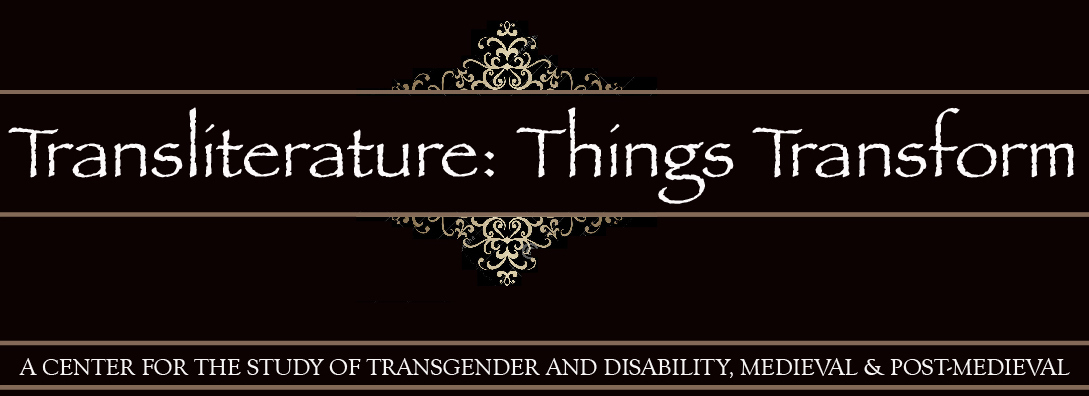"I would sit in church and always wonder,
'In God's eyes, how does he see me?'"
Caitlyn Jenner
20/20 Interview
20/20 Interview
______________________________
______________________________
Course Description and Outcomes
We live in a historical moment when the relationship between queerness and Christianity is being reconsidered and hotly debated. To better understand this debate, as well as the differences and potential common ground between members of the queer and Christian communities (including those who belong to both!), this seminar examines the history of Christianity and its relationship to queerness. Is Christianity a force for domination or liberation? Orthodoxy or creative multiplicity? Normativity or queerness? To answer these questions, we will read literature that explores how Christianity has both suppressed and in some sense created queerness, as well as how it has been reclaimed by queer communities. We will also look closely at how these historical tensions are being played out locally today. Special attention also will be given to the range of intersecting identities and communities that have responded to the meeting of faith and sexuality in various ways, drawing from diverse contexts of race, ability/disability, gender, and class. Readings include selections from the Bible, books about theology, and documentaries and memoirs attesting to the experience of LGBT Christians.
Course Objectives (Reflecting SAGES Learning Outcomes)
By the end of the course you will be able to T.E.A.C.H. on a range of ethical, historical, and aesthetic subjects:
- THINK critically on the rhetorical and ethical value of cultural narratives
- ENGAGE respectfully across perspectives alongside and opposing your own
- ARGUE dialectically with thesis driven claims that actively engage existing debates
- COMPOSE collaboratively using evidenced-based research and peer-review
- HONOR differences with nuance, complexity, and sympathy
Queer Christianity is a seminar designed to prompt meditation and discussion on the long history and futures of gender and sexuality in Christianity as it grew, divided, and evolved from western Europe to the Americas. The course readings are more concentrated on fewer texts to allow for more time to dwell with the questions each raise; rather than surveying the already extensive archive on issues of sex and sexuality in the Church. The seminar begins by challenging students to examine multiple readings of key scripture passages that are commonly invoked in bible-based arguments on LGBTQI issues. The seminar then moves into debating a few representative premodern theologians (Augustine, Aquinas, and Paul) as well as theologies of sex emerging from the LGBTQI, women's, and civil rights movements. Christianity is often called the religion of love, using the word in a host of divergent and even contradicting ways. This prompts the section of the seminar on queering love, where students will read C.S. Lewis's reflection on the four Greek words for love and interrogate the ways that the Church has failed to extend and recognize these forms of love to and with queer communities. The next section introduces a series of films on the culture wars in the United States and abroad wherein Christianity has been a force aimed at converting, fixing, and eliminating the LGBTQI population. The seminar ends with consideration of the LGBTQI saints already a part of the official Church record as well as those persons who have become saints within the wider queer family.
----------------------------------------
Queer Scripture
NRSV Bible, “Genesis 1 and Genesis 2”
NRSV Bible, “Leviticus 18-21” and “Deuteronomy 22-25”
NRSV Bible, “Genesis 18-19,” “Isaiah 56” and “Matthew 18-19”
NRSV Bible, “Song of Songs” (All)
----------------------------------------
Queer Theology
St. Augustine of Hippo, the Confessions, Book 1-2
St. Thomas Aquinas, Summa Theologica, Selections
St. Paul, The NRSV Bible, Colossians 3, Ephesians 5, Galatians 3 Council
M. Althaus-Reid, Queer God, Ch. 3: Trinitarians and God the Orgy
D.J. Lee, Rescuing Jesus, Ch. 8: Femmevangelical
G.K. Chesterton, Orthodoxy, “The Maniac” and “The Eternal Revolution”
----------------------------------------
Queer Love
C.S. Lewis, The Four Loves, “Storge”
Lewis, The Four Loves, “Philia”
Lewis, The Four Loves, “Eros”
Lewis, The Four Loves, “Agape”
----------------------------------------
Queer Conversions
Roger Ross Williams, God Loves Uganda (2013)
Aiken and Aparicio (dir.), The Transformation (1996)
Daniel G. Karslake, For the Bible Tells Me So (2007) Council
P.R. Lightsey, Our Lives Matter, Queer Black Women’s Lives
Lightsey, Our Lives Matter, Transforming Until Kin(g)dom Come
Lightsey, Our Lives Matter, The Biblical Crisis
----------------------------------------
Queer Saints
N. Constas (Trans.), The Life of Saint Marinos
The Life of St. Joan of Arc
D.W. Cross, Pope Joan, Ch. 11 “Joan,” and Ch. 14-18 “Brother John”
Cross, Pope Joan, Ch. 27-29 “Pope Joan,” and Author’s Note
L. Alcorn, Transgender Queen of Hell
C. Jenner, I Am Cait, “A New Beginning”






